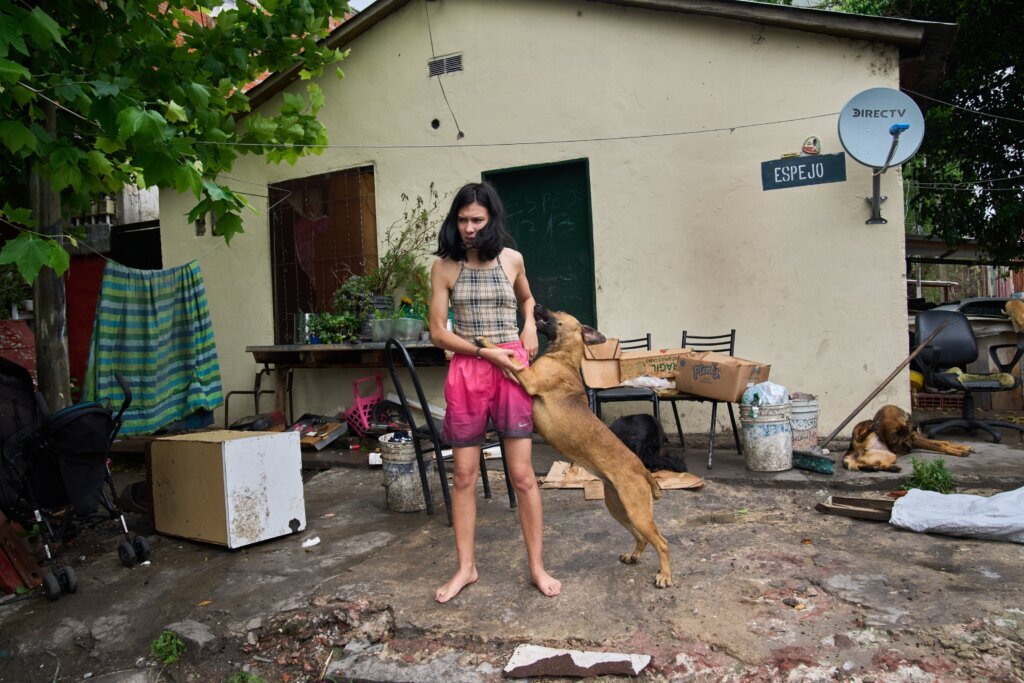BUENOS AIRES, Argentina (AP) —
On the northern bank of Argentina’s Riachuelo River, luxury car dealerships report sales surging since libertarian President Javier Milei scrapped import restrictions. Streets in the Puerto Madero financial district bustle with bankers who praise Milei for ending a yearslong ban on selling dollars online. Fine restaurants serve sushi and steak to Argentine oil executives who gush about his efforts to draw foreign investment.
On the opposite side of the polluted Riachuelo waterway, Veronica Leguizamon, 34, has only a few eggs, a carton of milk, and a handful of bread rolls left in her pantry. Clutching a Tupperware container, she braved heavy rain last Friday to carry home dinner for her four daughters from a soup kitchen in her neighborhood of Isla Maciel—a new daily routine since Milei slashed subsidies for public services and unwound price controls on staple foods.
“Before, we could choose what to cook,” she said. “Now we depend on others to know if we’ll eat or not.”
The contrasting fortunes of these Buenos Aires neighborhoods just over a kilometer apart illustrate the tensions polarizing the Argentine electorate in Sunday’s nationwide congressional midterms. As voters go to the polls, their vastly different perceptions of the economy stand to determine whether Milei succeeds and whether the Trump administration presses on with a financial rescue plan for its cash-strapped ideological ally.
“Within my little circle, everyone’s happy with how things are going,” said Fernanda Díaz, 42, who runs a yacht rental company in Puerto Madero. “When I step outside it, I see people worried about making it to the end of the month.”
### Milei’s Opposition Spooks Markets
Commenting on the midterm elections, U.S. President Donald Trump threatened to rescind a $20 billion aid package for Argentina if Milei suffers a defeat at the hands of a “socialist or communist,” prompting a sell-off in Argentine markets. Trump was apparently referring to Argentina’s loosely populist, broad-based ideological movement known as Peronism, which helped deliver the economic shambles that Milei inherited in late 2023.
Reckless public spending under a succession of Peronist governments, including that of former President Cristina Fernández de Kirchner—now serving house arrest for corruption—brought Argentina infamy for its inflationary spirals and sovereign debt defaults.
“We needed a major change,” said Díaz, who, before launching her yacht business, lost her job as a top executive when Chilean retail group Falabella shut down its Argentine operations over high inflation, import restrictions, and a wildly oscillating exchange rate under the previous Peronist government. “I voted for Milei’s government and was really enthusiastic at first.”
Markets shudder at the thought of a Peronist return. When the Peronist coalition beat Milei’s libertarian party by a landslide in last month’s Buenos Aires provincial elections, investors panicked that the president’s free-market overhaul was losing support and rushed to pull capital out of the country.
In an extremely rare move, the U.S. Treasury came to the rescue, selling dollars to help meet soaring demand for greenbacks, signing a $20 billion credit line and promising another $20 billion in aid from private banks, rather than U.S. taxpayers. Assets jumped on each of the Trump administration’s announcements.
Having dodged a currency crisis, Milei and his supporters were, briefly, ebullient.
“I’m proud of the U.S. support. It helps us grow stronger,” said Luciano Naredo, 28, a salesman of high-end cars in Puerto Madero. “I think Argentina is finally taking its rightful place in the world.”
### Fed Up with the Chainsaw
Although Isla Maciel has long been a Peronist stronghold, 42% of the wider Avellaneda municipality voted for Milei as president in 2023, betting on the wild-haired political outsider to stabilize the economy and end triple-digit inflation.
Wielding a diesel-fume-spewing chainsaw at rallies, Milei cut tens of thousands of government jobs, slashed state spending, and burned through foreign exchange reserves to shore up the chronically depreciating peso. Inflation dropped in fulfillment of Milei’s flagship campaign promise. But almost two years into his economic overhaul, purchasing power has dropped, too.
With inflation still hovering over 30% annually, residents of Isla Maciel have watched the value of their wages, pensions, and welfare payments shrivel.
“You can’t live on 290,000 pesos a month with today’s inflation,” said Epifanía Contreras, 64, as she packed her plastic bowl with rice and peas at the Foundation of Isla Maciel soup kitchen, referring to her $200 monthly pension. “The situation is getting worse and worse. It’s not fair.”
Volunteers serving sopa paraguaya, a custardy cornbread, to a stream of regulars on Friday said demand has more than doubled in the past year. Those who once picked up occasional meals to save some cash now turn up hungry.
“People are coming out of real need,” said Maria Gomez, a volunteer cook. “It’s total chaos.”
A third fewer residents of the Avellaneda municipality supported Milei’s libertarian party in last month’s provincial election than in 2023, expressing nostalgia for the redistributive policies of the opposition Peronist party despite its more recent reputation for financial ruin. Milei has vowed in campaign speeches to press on with his harsh austerity program. But his chainsaw prop, once a rally staple, hasn’t been seen in months.
### Argentines Face Familiar Uncertainty
Most polls predict a tight race between Milei’s La Libertad Avanza (Liberty Advances) party and the Peronist coalition. Half of Argentina’s lower house, or 127 seats, and a third of the Senate, or 24 seats, are up for grabs in Sunday’s elections.
Currently controlling less than 15% of Congress, the government last managed to pass a law in March. La Libertad Avanza hopes to win enough seats to defend austerity measures, uphold presidential vetoes, and impose labor and tax reforms.
The stakes are high. A defeat for Milei could pile more pressure on the peso and force a painful devaluation of the currency’s controlled exchange rate, raising inflation and undermining the president’s main achievement.
Weary Argentines are, again, bracing for impact.
“Each new government comes in, criticizes the last one, promises to do things differently and ends up being the same or worse,” said Matías Paredes, 50, a real estate broker whose foreign clientele vanished with Milei’s strong exchange rate. “This country moves in cycles.”
https://wtop.com/world/2025/10/argentina-votes-in-midterm-elections-set-to-test-president-mileis-mandate-and-us-support/


